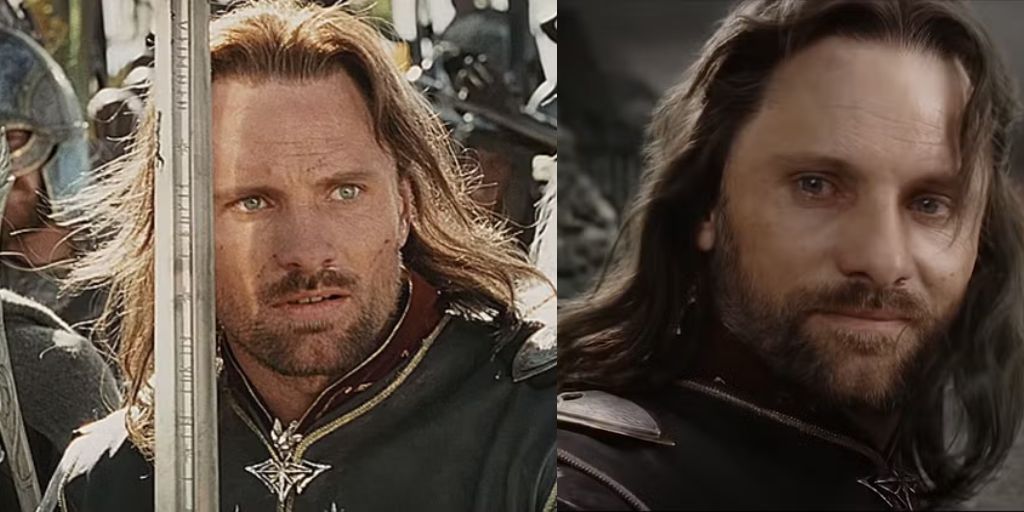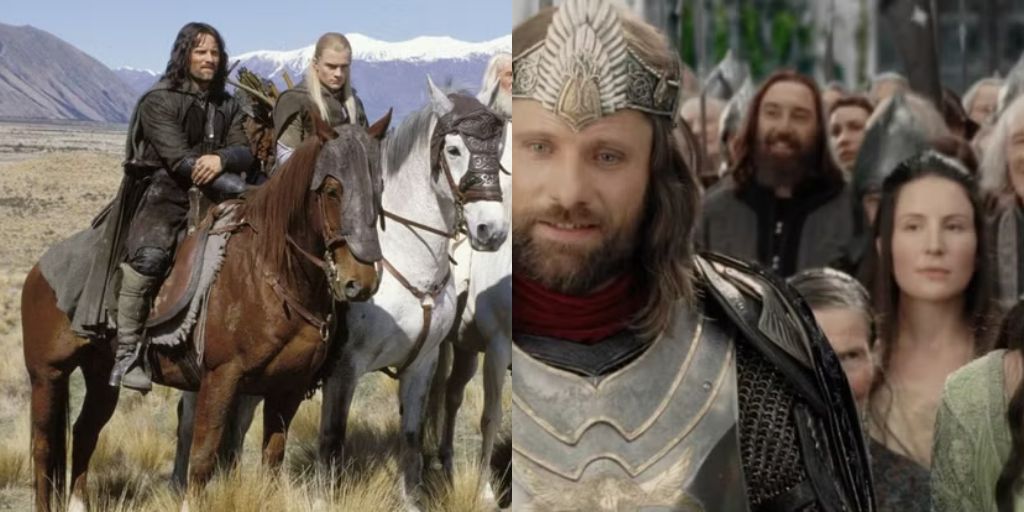One of the most fascinating discussions about The Lord of the Rings is about who could travel to the Undying Lands after the story ended. In The Return of the King, Bilbo Baggins, Frodo Baggins, and Samwise Gamgee all traveled with Gandalf across the sea. Later, Legolas and Gimli also made the journey. However, Merry, Pippin, and Aragorn never received permission to sail to the West.
It may seem unfair that Aragorn was not allowed to go, especially because he played such an important role in the Fellowship. However, his story makes it clear why he had to remain in Middle-earth. His destiny was always tied to the future of Men, and his journey was meant to stay with his people and lead them.
The Undying Lands, also called Valinor, were a place where only certain beings could go. Normally, only Elves and the Ainur (powerful spiritual beings) had the right to sail there.
Elves belonged to Middle-earth, but their true home was always in Valinor. They had the choice to remain in Middle-earth, but over time, they would fade. By the end of the War of the Ring, their time in Middle-earth had ended, so many chose to leave.
Legolas, as an Elf, had the right to go. Dwarves, however, were not allowed to enter Valinor, but Gimli was given special permission. His deep friendship with Legolas and admiration for Galadriel allowed him to be an exception. The Valar (the rulers of Valinor) saw his role in Middle-earth as important, and they allowed him to enter.
His journey with Legolas helped heal old conflicts between Elves and Dwarves, making his place in Valinor even more meaningful.
The Ring-Bearers Were Given a Chance to Heal
Bilbo, Frodo, and Sam were allowed to go for a very different reason. All three carried the One Ring at some point, and it left a permanent mark on them. The Ring affected not only their bodies but also their spirits. This damage could never fully heal in Middle-earth, so they were given the chance to live their final days in peace in Valinor.
Frodo, in particular, suffered greatly after the destruction of the Ring. Even though he saved Middle-earth, he could never find true peace again. He experienced deep emotional and physical pain that no medicine or magic could cure. By allowing him to go to Valinor, the Valar gave him a place where he could finally rest without suffering.
Bilbo, though less affected, had also carried the Ring for many years. The burden of its power changed him, and he grew weaker over time. Like Frodo, he was granted a peaceful life away from the troubles of Middle-earth.
Sam’s journey was a little different. He carried the Ring for only a short time, but this still connected him to the others. At first, he remained in Middle-earth and lived a long life with his family. However, after many years, he was also allowed to sail West, following Frodo’s path.
It is important to remember that the Undying Lands did not make these travelers immortal. They still had normal lifespans and eventually passed away. The difference was that they could live out their remaining years free from pain and suffering.
Aragorn’s Fate Was Always Tied to the Future of Men
Aragorn’s story was different from those who sailed West. His role in The Lord of the Rings was not just about defeating Sauron. He was meant to rebuild the world of Men and lead them into a new era. His journey was always about embracing his destiny as a leader and a king.
Tolkien wrote a lot about mortality in The Lord of the Rings. Every race in Middle-earth had a different connection to life and death. Elves were immortal, meaning they could live forever unless they were killed. Because of this, their fate was tied to the world itself. They could never leave it, even if they chose to go to Valinor.
Men, on the other hand, were mortal. When they died, their spirits left Middle-earth completely. Even the Elves did not know where Men’s spirits went. Tolkien called this the “Gift of Men,” given to them by Eru Ilúvatar, the highest divine being in Middle-earth.
Aragorn understood this gift. He accepted that his time in Middle-earth had a limit and that he was meant to fulfill his destiny as a king before passing on. Unlike others, he did not fear death. Instead, he saw it as a natural part of life.
This understanding shaped many of his decisions. He let Frodo go alone to destroy the Ring because he knew Men could not resist its power. He also chose to live as a mortal, even though his Elvish heritage gave him a longer life. He never tried to escape death or extend his life beyond what was natural.
Aragorn’s Rule Marked the Beginning of a New Age
The War of the Ring ended the Third Age of Middle-earth. After Sauron’s defeat, the world changed. The time of the Elves came to an end, and the time of Men began. Aragorn’s role was to lead this new world.
As King Elessar, he ruled over Gondor and Arnor, bringing stability and peace. His leadership helped rebuild what was lost in the wars against Sauron. Instead of ruling for power, he ruled to heal the lands and ensure a better future for his people.
His marriage to Arwen was also a strong symbol of this new age. Arwen, an Elf, chose to give up her immortality to be with Aragorn. She accepted a mortal life, just as he accepted his fate as a Man. If Aragorn had chosen to go to Valinor, it would have gone against everything they had built together.

Aragorn’s story also connected to the past mistakes of Númenor, the ancient kingdom of his ancestors. The Númenóreans once tried to invade Valinor, hoping to gain immortality. This act of defiance led to their downfall. Aragorn, as the last true heir of Númenor, corrected this mistake by accepting mortality with dignity.
When the time came, Aragorn chose to pass away peacefully, like the great Númenórean kings of old. His death was not a tragedy but a fulfillment of his destiny. He had done everything he was meant to do, leaving behind a strong and united kingdom.
Conclusion
The decision of who could sail to the Undying Lands was based on deep themes within The Lord of the Rings. The Elves left because their time in Middle-earth had ended. The Ring-bearers were granted peace after their great suffering. Gimli was allowed to go as a symbol of friendship and healing.
Aragorn, however, had to stay. His story was about accepting his role as a leader and embracing mortality. He built a strong future for Men and corrected the mistakes of the past. His life was not about seeking eternal peace but about fulfilling his purpose in Middle-earth.




